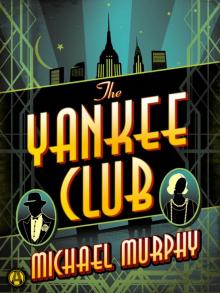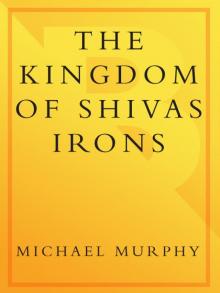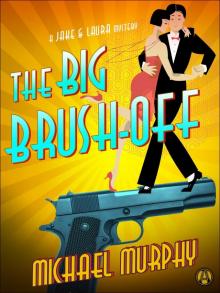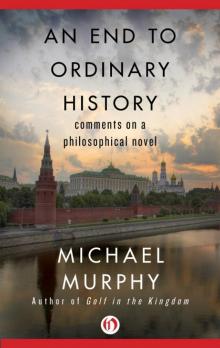- Home
- Michael Murphy
Golf in the Kingdom Page 3
Golf in the Kingdom Read online
Page 3
I have thought of that line many times, “the only way you can play in the kingdom.” I didn’t fully appreciate it at first. Not until I realized that for him the Kingdom of Fife was very nearly the Kingdom of Heaven.
But I was not ready to appreciate it then. Even though he had reached out to me, I could feel his scrutiny. I felt a growing edge of resentment as we got ready for our drives—it was going to be hard to shoot a 72.
But my hopes did not die easily. The upcoming hole was a par five, a possible birdie—I could get a stroke back there, one or two more on the other par fives, shoot even on the rest, and still get a 72. I made my own game plan as I watched MacIver get ready to drive. Go all out on the drive, I thought, but keep it smooth—I formed an image of Snead’s strong, rhythmic backswing and combined it with a picture of Shivas’s concentration as he stood up to the ball. Or just swing like Shivas himself; that is what I resolved to do as I teed up and took my stance. I waggled the club carefully, remembering the first tee, picturing Shivas as he took his stance, thinking also of Snead as I had seen him once during a driving contest at Pebble Beach. I peered fiercely into the ball and swung. It sailed in a long sweeping hook, an impressive sailing carry across fairway and rough, far out into the gorse. It was perhaps the longest shot I had ever hit.
I clenched my teeth, as if biting some invisible opponent. Exhilaration over this sudden power was mixed with frustration at my deteriorating score. I asked Shivas if I could hit another drive in case the ball was lost.
“No, not heer,” he said forbiddingly, “ye can aye find it in tha’ particular ruif.”
Again there was a sense of unreality about our exchange. As he got ready to shoot I slammed my club into the bag and swore out loud. It didn’t seem to faze him though; he hit another amazing drive down the middle of the fairway.
The rough along the third hole at Burningbush is full of rocks and gorse. Gorse, a low brambly shrub of the genus Ulex, is common to Scottish wastelands and golfing links. It is said by some to grow as well in the fields of Hell. Occasionally, a ball will come to rest upon its top branches a foot or two above the ground. In that case one is required to play out, since the shot is possible—barely. That was my good fortune then. I could see my ball as I approached, nestling on its thorny cushion awaiting deliverance.
In playing a shot like this you must be careful not to jostle the bush in any way, for the ball may sink deeper into its branches. Knowing this, I carried my bag of clubs in a wide arc around the ball and stepped toward it slowly, seven iron in hand, determined to hit my approach within range of the green. An image of par still danced in my head, in spite of all the omens. I held the iron away from the yellow blossoms as I took my stance, as one does in a sand trap, and lined up my feet. I started the club back a few times to see that my swing would not be impeded by rocks or gorse—there was plenty of room. I eyed the flag, still so far way. Then as I began to swing in earnest, the ball sank gently out of sight among the flowers on that innocent bush. I looked up to the sky and shook my head. “This fucking game,” I said, “this fucking game.”
“How does it lie?” Shivas’s stentorian voice suddenly reverberated across the gorse. He stood watching me from the edge of the fairway some thirty yards away.
“It fell into the middle of a whin,” I yelled back. “Should I play it, or drop out?” Perhaps he would show me some mercy.
“No, play it like it lies,” he yelled. “It’ll come out.”
I cursed him silently. Since the ball was invisible now I had to guess how deep my seven iron should cut into the shrub. I lined up again, eyeing the distant flag, testing my backswing for potential obstacles. Then I chopped down viciously. Yellow flowers flew in all directions, a veritable shower of gold, but no ball was forthcoming.
“Bring me a bouquet when ye come oot,” he bellowed. I looked at him standing there. I couldn’t believe it, it must have been the Scottish sense of humor.
“I can’t even see the ball,” I shouted back. “I think I should drop out.”
“It’ll come out,” he answered. “Keep choppin’.”
I swung again, even harder than I had the first time, and hit a rock as I hit the ball. Sparks flew in all directions, a second shower of gold. The ball flew about 30 feet, into another patch of gorse.
“Fucking bastard,” I said, chopping furiously at the devastated bush. “Fuck the score.” Shivas had turned away and was walking toward his ball. I felt an urge to give him the finger.
I hit a wedge shot onto the fairway and joined MacIver. I was lying four and hadn’t even reached his modest drive yet.
At about this point I began to feel like revenge—against Shivas, the course, even Maclver for his plodding game. I would hit a 250-yard three wood onto the green and hole the putt for a bogey, a prodigious recovery; that would show them. I thought of Snead again as I lined up, of Hogan, Jimmy Thompson, George Bayer, a whole array of potent images to summon my strength. I threw everything into the shot—and topped it badly. It bounced straight up and landed about 20 or 30 feet away. Poor MacIver, he was trying to give me room, trying not to interfere with my struggle while concentrating in his own methodical way. Still he could not suppress the urge to give me some advice. He was a middle-aged, kindly-looking man, with a trim mustache and crisp manners, perhaps an Army officer judging from his bearing. “Now, Murphy,” he said, “just try usin’ yer short irons tae finish the hole.” It was the most galling remark of all.
I mumbled something in reply, and watched him hit another inexorable shot down the middle.
Shivas was standing near his ball, ahead of us to our right.
“The twa o’ ye remind me o’ the tortoise and the hare,” he said. I gritted my teeth and shook my head to acknowledge the fact that I had heard him.
My ball now had large gashes in it, and when I hit my next shot—with a five iron, dejectedly following MacIver’s advice—it wobbled in flight as a ball will do after being so badly treated. It veered in two directions like a wounded bird.
“Guid man!” cried our professional. “’Tis the first time Ah e’er saw a hook and a slice on one shot.” I was beginning to think I was his straight man.
He put his three wood on the green, hitting the very shot I had visualized for myself.
When we got to the green Shivas lay two and was putting for an eagle; MacIver lay four, just 3 feet from the pin; and I lay seven. I was tempted to pick up, but sensed what they would say. In spite of my growing resentment, Shivas’s authoritative presence was enough to keep me quiet. I marked my ball and started to clean it. The gashes I had given it smiled hideously. “May I put down another?” I asked. Neither of them answered. Perhaps they were too sorry for me to say no. But they were not sorry enough to say yes. I put the mutilated ball back on the putting surface. As I bent down to make the putt I had the impression—I can remember it to this day—that one of the gashes winked at me. It’s only a game after all, it seemed to say, only a game. When I putted, the point was made more vividly. The ball veered to the left like one of those trick balls that are sold for practical jokes. The thought occurred that I would never get it into the hole.
MacIver sunk his putt for a par, his first of the round. Shivas narrowly missed his, ending up with another birdie. I tried again. This time the ball veered to the right, stopping about 3 feet from the cup. Then Shivas, who had been looking away during the entire performance, turned and said, “Noo try willin’ it in, it’ll never get there in the regular coorse o’ things.” He meant to be helpful, I suppose. I glowered back at him, my first act of overt defiance. I hit the putt without lining it up, not caring where it went. It rolled straight at last, hit the back of the cup, bounced high and came to rest on the other side. Seeing it lying there, I remembered something I had seen my brother Dennis do back in our high school days. Following his example, I leaned back and looked at the sky, then raised my arm to God and gave Him the finger. My two playing partners laughed and turned away. I tapped the ball i
nto the hole and we walked off the green in silence.
On the next tee, MacIver, methodical again after my display, took out his score card and wrote down their scores. “How many, Murphy?” he asked crisply, peering at the card. I stared at him for a moment. He peered at the scorecard, waiting for my reply. How many! They were going to count them! “Just give me an X,” I said.
“A what?” He looked at me as if he did not comprehend.
“I’m not counting that hole,” I said.
“Noo, Michael,” said Shivas, “put doon yer score, it’ll do ye good.”
I could tell he was trying to reassure me, but I also sensed their incredible sense of honor about keeping score. My dropping out offended their whole sense of things.
“An X?” asked MacIver, as if he hadn’t heard me right.
“Oh, put down a ten,” I finally said with exasperation.
For a moment there was silence. MacIver stared at the scorecard, pursing his lips, somehow reluctant to write it down. Shivas cocked his head to one side as if he were thinking. It was a silence full of unspoken thoughts. Finally, MacIver lifted a hand to scratch his ear and looked at his teacher for advice. Shivas looked solemnly at me.
“Michael, Ah think ’twas eliven,” he said.
MacIver looked at me, waiting for my assent. “An eleven,” I said, nodding with resignation, and he carefully wrote it down.
Shivas came over to me then and put a big hand on my shoulder. “Dona’ worry aboot the score so much,” he said, “it’s not the important thing.” He squeezed my shoulder and turned back to MacIver with more instructions. Not the important thing, I thought as he walked away, not the important thing! I was touched by his reaching out—and dumfounded.
Scoring not the important thing! While they watched me like hawks! I thought about it all the way to the fourth tee.
When frustration grew to the breaking point during a round of golf I would do either one of two things—get ostentatiously slap-happy and hit my shots in any direction as if it were the outing that was important, or play with concentrated fury. I went into the latter mode on hole number four—I would show them. Playing that way, I would think of Ben Hogan, his Indian profile cutting through every obstacle, and squint my eyes like a prairie scout. I would begin an interior conversation, or rather a stream of incantations that had as their goal the willing of the ball to its target. It was a kind of black magic, whereby the mind forced itself upon the ball and steered it right in spite of all the errors my body committed. I sometimes tried it at baseball and football games. I had even developed a whammy which, when used properly, could bring a man down.
I gathered myself for the attack as we got ready to tee off. I summoned images of fierce swingers like Hogan and Bayer, with something of Shivas’s own concentration thrown in, and glowered down the fairway. When I stood up to the ball I held my stance for a long time, eyes squinting, showing them that I really meant business now, and imagined the ball rocketing toward the green. I hit an exceptionally long drive.
It was a 400-yard par four, curving to the left. The drive cut across the corner of the dog-leg, leaving me a seven iron to the green. I hit my second with the same concentrated anger, a low shot that sailed true—and sailed over the green into some unknown hazard. I had willed it with all my might, and had willed it too well: I had hit the shot some 20 yards farther than I ordinarily did with a seven iron from that kind of lie.
We never found the ball. It had disappeared into a rocky draw that led down to the ocean. Perhaps it had bounced into the waves. So I dropped a second ball and shot a double bogey.
When we finished the hole, I sat on a rock and looked at the waves. Shivas laid a hand on my shoulder. “Ye try too hard and ye think too much,” he said with the authority that Scots golf professionals often assume. “Why don’t ye go wi’ yer pretty swing? Let the nothingness into yer shots.” His words made me feel better. It did seem silly to ruin all the beautiful scenery with the fuss I was making.
The next hole was a kind of purgatory after the hell I had put myself through. Perhaps it was the influence of his advice and its apparent success with MaclIver, perhaps it was the resignation I felt about my score. In any case I managed to get a bogey five, playing each shot as carefully as MacIver had been doing. The tortoise was teaching the hare.
I had overheard Shivas telling his pupil to think of the ball and “sweet spot” belonging together. The “sweet spot” is the place on the clubface where the ball should be struck; one might hit a decent shot, even a very good one, and not hit it exactly, but when you do there is no mistaking it—to hit it is the very essence of golfing pleasure. Shivas had told MacIver that the ball and the sweet spot were “already joined.” “Just see it that way,” he had said, “they’re aye joined afore ye started playin’.” The advice helped. I began to imagine them fitting together as I laid the clubhead behind the ball. It helped settle me down. I had—almost in spite of myself—joined MacIver to form a small procession following in our teacher’s impressive wake.
For the next few holes our game was relatively uneventful. Maclver continued keeping my score—he was probably incapable of doing otherwise—and I continued thinking that the clubface and the ball were one. I watched Shivas whenever I could, and slowly his example began to influence me in a peculiar way. I became more and more aware of the feeling of the game, of how it was to walk from shot to shot, how it was to feel the energy gathering as I addressed the ball, how the golf links smelled. It was not that he said anything to me, but his example. He was so physical in the way he moved and responded, like a big animal. The only thing he asked me in fact during those middle holes was whether I could smell the heather. “It’s growin’ way over there,” he said, pointing to a distant hill, “but ye can smell it from heer.” I could smell it, and though I didn’t tell him, I could also smell that powerful odor of eucalyptus and baking bread.
Those middle holes were a lesson in resignation and simple sensing. No more ambitions for prodigious shots and scores, they seemed out of reach; just a decent modest game and enjoyment of the endless charms of Burningbush. It was a new way to play for me. I had always focused on the score and the mechanics of my swing. Now my focus included other things, like the heather and the sea. The holes ran along water, and you could see for miles along the sandy links land, across gently rolling hillocks lavender and yellow in the afternoon sun. Better sights to fill my memory with than mutilated golf balls and careening shots.
MacIver now had gone into the second phase of his game plan. He was working on something called “true gravity”—something, as far as I could make out, that involved an awareness of “energy-dimensions” and the relations of things. Following Shivas’s instruction, he was trying to “see” the subtle fields of energy that were supposed to surround the ball, the club, and his body. Although they kept me out of their conversations, I overheard them discussing it from time to time and began to see if I could understand what it was all about. I had heard other strange theories during my golfing travels—golfers keep coming up with amazing things along this line—but nothing quite so organized as this. MacIver was now trying to see the one energy field that enveloped his body, ball, and club. For the first holes he had been focusing exclusively on the ball and clubface, he was extending it now to include the rest.
I tried it for three or four shots but nothing seemed to happen. I did keep my eye on the ball, however, and that was a gain. Maybe that is what these things are all about, I thought, ways to keep a person looking at the ball—anything to help concentration. Plenty of other things had been tried, God knows, why not metaphysics? Though I failed to see the auras MacIver was looking for I felt a new elasticity in my swing. Then on the ninth hole I did see something. It wasn’t much, just the tiniest glimpse, but I did seem to see a yellow light around a sea gull swooping in from the sea. Then as I was driving on the tenth it happened again, a tiny aura around the ball, a violet one this time. When I hit the ball I hit the sweet s
pot.
“That’s the sound we want,” said Shivas, as if he had been waiting to hear it. The drive was not particularly impressive, but it felt good.
As I walked toward the ball, I wondered if seeing those auras could be tricks of the retina. I told him what had happened and stated my doubts.
“Noo, Michael,” he said firmly, “when ye think tha’ maybe it’s yer retina, ye’r just one step awa’ from really seein’ things.” On my approach shot I hit the sweet spot again, after watching the “aura” expand and contract, and the ball landed 20 feet from the pin. I told him what had happened after we finished the hole. “Keep swingin’,” he said. Just the two words, nothing more.
I parred ten and eleven, fascinated with what I would see and feel on each shot. This was a new kind of game for me, a series of strange sensations and intuitions, my first exposure to that order of things called “true gravity.” But I could only sustain it for a while. On the twelfth hole our drive was into the wind, down a narrow fairway that dog-legged to the right. Familiar images of disaster came back to haunt me as I took my stance. I sliced the drive and the sea breeze carried it into the rough. Shivas walked along beside me up the fairway, and asked me what I was thinking. I told him about the awful thoughts. “They’ll pass,” he said, “if ye daena’ fight ’em. Come back to where’er ye were a minute ago. Wait ’em oot.” Those words were a great help—not only for the rest of the round but for my life ever since. The admonition to “wait ’em oot” was one of those sayings of his that came back to haunt me.
I managed the hole in bogey, by hitting a conservative wedge from the rough and approaching the green with a five iron. When MacIver asked my score there was pleasure in saying that I had made a five—such a different reaction from the one I had felt on the third tee! Even a bogey seemed good. Everything was beginning to carry some unexpected satisfaction.

 Little Squirrels Can Climb Tall Trees
Little Squirrels Can Climb Tall Trees The Yankee Club
The Yankee Club The Kingdom of Shivas Irons
The Kingdom of Shivas Irons Wings in the Dark
Wings in the Dark The Big Brush-off
The Big Brush-off Dreamspinner Press Year Nine Greatest Hits
Dreamspinner Press Year Nine Greatest Hits Jacob Atabet
Jacob Atabet Jacob Atabet: A Speculative Fiction
Jacob Atabet: A Speculative Fiction A Night at the Ariston Baths
A Night at the Ariston Baths The House of Pure Being
The House of Pure Being End to Ordinary History
End to Ordinary History Golf in the Kingdom
Golf in the Kingdom All That Glitters
All That Glitters